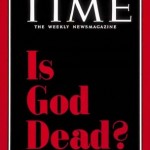 One of the great universals of humankind is a sense of the transcendent. Nearly all people who have ever lived everywhere on the earth have had a sense that there is a God who exists “up there” in one form or another. The world religions of our day testify to this great human sense of the transcendent, and the gods of bygone days are manifold. Granted that there is great variety in the understanding of this God, the nature of this God, and the character of this God, pretty much everyone has a sense that there simply must be and is something bigger and more ultimate than us. To not believe so is, indeed, highly unusual. So natural is belief in God that the scriptures affirm (quite accurately as anthropology has affirmed) that “the fool says in his heart that there is not God” (Psalm 14:1; 53:1).
One of the great universals of humankind is a sense of the transcendent. Nearly all people who have ever lived everywhere on the earth have had a sense that there is a God who exists “up there” in one form or another. The world religions of our day testify to this great human sense of the transcendent, and the gods of bygone days are manifold. Granted that there is great variety in the understanding of this God, the nature of this God, and the character of this God, pretty much everyone has a sense that there simply must be and is something bigger and more ultimate than us. To not believe so is, indeed, highly unusual. So natural is belief in God that the scriptures affirm (quite accurately as anthropology has affirmed) that “the fool says in his heart that there is not God” (Psalm 14:1; 53:1).
It is a fascinating fact that with all of the doubts and all of the evils that assail our culture – all of the questioning of the Bible, all of the disillusion with “organized religion,” all the furor over pedophile priests and money-grubbing televangelist charlatans, most folks in this country still believe in God. In fact only about 4% of the population self-identify as atheists (Those who say, “There is no God”) and half of these believe in a higher power of some kind (!?), so that leaves a very tiny proportion of people who actually believe there is no God.
There was a time in the mid-twentieth century (and even much earlier) when firebrand atheists such as Bertrand Russell confidently affirmed that thinking people would soon cast off such silly antiquated anti-rational notions as belief in God or in his dusty old contradiction ridden book. Or belief in “God’s Son” and his miracles and virgin birth and resurrection from the dead and all kinds of things (including demons – demons for goodness sake!) that modern thinking people couldn’t ever begin to accept. Well, Russell is dead now, as is Voltaire, as are many in a long line of that scant number who against the force of history, nature, conscience, and reason deny the existence of God. Friedrich Nietzsche once proclaimed the death of God, but a t-shirt framed an appropriate response: “God is dead,” Nietzsche; “Nietzsche is dead,” God.
Atheism is not dead, though. A new generation has emerged to recycle the same tired atheistic arguments from the dust heap of history. Among them are Sam Harris, Christopher Hitchens (Author of “god is not good”), and, most famously, Richard Dawkins (Author of many popular books such as “The God Delusion” and “The Blind Watchmaker”). These “new atheists” are every bit as arrogant and smarmy as the old kind. And their arguments are as silly and as inaccurate as can be imagined. There isn’t a bit of evidence offered to offset the immense weight of evidence both outside and inside of man that cries out that “God Is!” What there is from the new atheists is a lot of condescending prattle about how foolish, ignorant and mindless those of you are who persist in holding onto your childish view of deity. How passe! Dawkins even favors referring to those who have thrown off the shackles of such bondage “brights” (I’m not making this up.). That means that we who hold to God’s existence are a bunch of “dims” – shadow people who have yet to be enlightened.
It must be a huge blow to the “new atheists” that though they sell many books people remain entirely unconvinced. Indeed, instead of convincing massive droves to embrace atheism, there has been a number of prominent atheists who have followed reason and evidence to reject atheism (Antony Flew) and/or to embrace the Christian faith (A.N. Wilson). Perhaps we Christians are a bit brighter than we are given credit for. Don’t let anyone fool you (especially the “new atheists”) – it is entirely reasonable to believe in God. It is unreasonable not to.